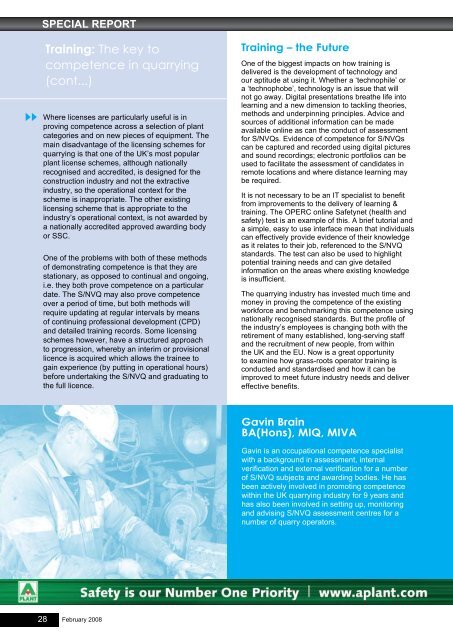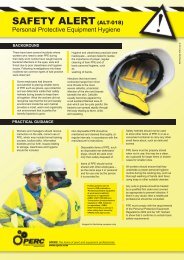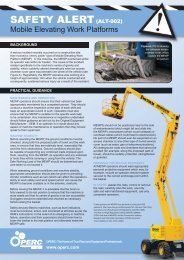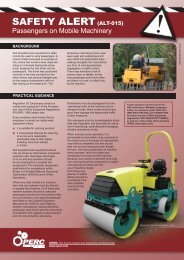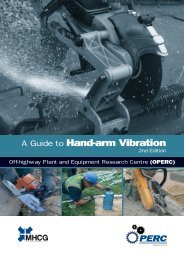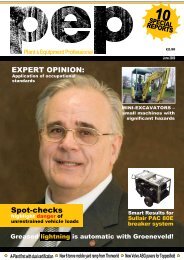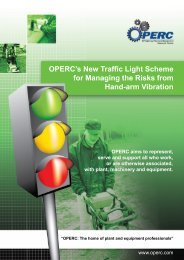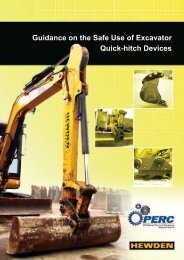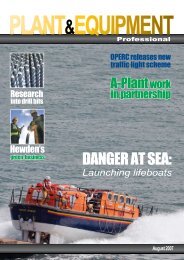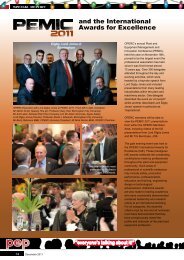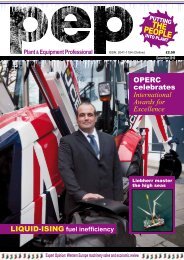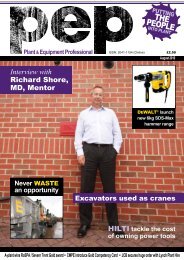Plant&Equipment
Download pdf - OPERC
Download pdf - OPERC
- No tags were found...
You also want an ePaper? Increase the reach of your titles
YUMPU automatically turns print PDFs into web optimized ePapers that Google loves.
special report<br />
Training: The key to<br />
competence in quarrying<br />
(cont...)<br />
Where licenses are particularly useful is in<br />
proving competence across a selection of plant<br />
categories and on new pieces of equipment. The<br />
main disadvantage of the licensing schemes for<br />
quarrying is that one of the UK’s most popular<br />
plant license schemes, although nationally<br />
recognised and accredited, is designed for the<br />
construction industry and not the extractive<br />
industry, so the operational context for the<br />
scheme is inappropriate. The other existing<br />
licensing scheme that is appropriate to the<br />
industry’s operational context, is not awarded by<br />
a nationally accredited approved awarding body<br />
or SSC.<br />
One of the problems with both of these methods<br />
of demonstrating competence is that they are<br />
stationary, as opposed to continual and ongoing,<br />
i.e. they both prove competence on a particular<br />
date. The S/NVQ may also prove competence<br />
over a period of time, but both methods will<br />
require updating at regular intervals by means<br />
of continuing professional development (CPD)<br />
and detailed training records. Some licensing<br />
schemes however, have a structured approach<br />
to progression, whereby an interim or provisional<br />
licence is acquired which allows the trainee to<br />
gain experience (by putting in operational hours)<br />
before undertaking the S/NVQ and graduating to<br />
the full licence.<br />
Training – the Future<br />
One of the biggest impacts on how training is<br />
delivered is the development of technology and<br />
our aptitude at using it. Whether a ‘technophile’ or<br />
a ‘technophobe’, technology is an issue that will<br />
not go away. Digital presentations breathe life into<br />
learning and a new dimension to tackling theories,<br />
methods and underpinning principles. Advice and<br />
sources of additional information can be made<br />
available online as can the conduct of assessment<br />
for S/NVQs. Evidence of competence for S/NVQs<br />
can be captured and recorded using digital pictures<br />
and sound recordings; electronic portfolios can be<br />
used to facilitate the assessment of candidates in<br />
remote locations and where distance learning may<br />
be required.<br />
It is not necessary to be an IT specialist to benefit<br />
from improvements to the delivery of learning &<br />
training. The OPERC online Safetynet (health and<br />
safety) test is an example of this. A brief tutorial and<br />
a simple, easy to use interface mean that individuals<br />
can effectively provide evidence of their knowledge<br />
as it relates to their job, referenced to the S/NVQ<br />
standards. The test can also be used to highlight<br />
potential training needs and can give detailed<br />
information on the areas where existing knowledge<br />
is insufficient.<br />
The quarrying industry has invested much time and<br />
money in proving the competence of the existing<br />
workforce and benchmarking this competence using<br />
nationally recognised standards. But the profile of<br />
the industry’s employees is changing both with the<br />
retirement of many established, long-serving staff<br />
and the recruitment of new people, from within<br />
the UK and the EU. Now is a great opportunity<br />
to examine how grass-roots operator training is<br />
conducted and standardised and how it can be<br />
improved to meet future industry needs and deliver<br />
effective benefits.<br />
Gavin Brain<br />
BA(Hons), MIQ, MIVA<br />
Gavin is an occupational competence specialist<br />
with a background in assessment, internal<br />
verification and external verification for a number<br />
of S/NVQ subjects and awarding bodies. He has<br />
been actively involved in promoting competence<br />
within the UK quarrying industry for 9 years and<br />
has also been involved in setting up, monitoring<br />
and advising S/NVQ assessment centres for a<br />
number of quarry operators.<br />
28<br />
February 2008


